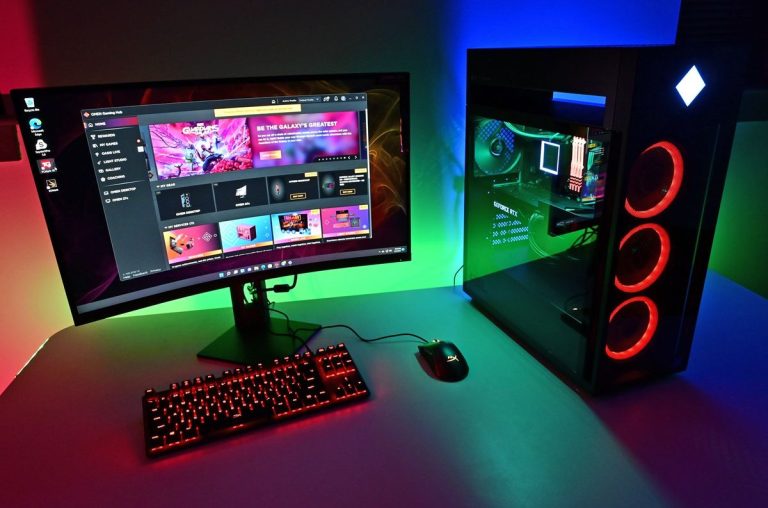Overheating is one of the most common and frustrating problems gamers face, especially during long or graphically intensive gaming sessions. When your PC components, such as the CPU or GPU, run at high temperatures for extended periods, they begin to lose efficiency and performance. You might notice lag, reduced frame rates, sudden crashes, or even unexpected shutdowns — all signs that your system is struggling to stay cool.
Beyond performance issues, excessive heat can also shorten your PC’s lifespan. Constant overheating accelerates hardware wear and tear, damages sensitive components, and can eventually lead to permanent failures. Even powerful gaming rigs are vulnerable if cooling and airflow are not properly managed.
In this guide, we’ll explain how to prevent your PC from overheating while gaming using practical and effective methods. You’ll learn how to improve airflow, clean and maintain your system, optimize fan settings, and adjust in-game performance to reduce thermal load. Whether you’re a casual player or a hardcore gamer, these cooling and optimization techniques will help you keep your system running cool, stable, and efficient for years to come.
Why Your PC Overheats During Gaming
Your PC overheats during gaming mainly because intense workloads push the hardware to its limits. Modern games demand significant processing power from both the CPU (Central Processing Unit) and GPU (Graphics Processing Unit). As these components work harder to deliver smooth gameplay and high-quality visuals, they consume more electricity — and that energy output turns into heat. Without proper cooling, the temperature inside your PC can quickly rise beyond safe levels.
One major factor contributing to overheating is poor ventilation. If your PC case doesn’t allow enough airflow, the hot air generated by internal components gets trapped, causing a rapid temperature increase. Similarly, dust buildup on fans, vents, and heat sinks can block airflow, making it difficult for the cooling system to do its job efficiently. Over time, even a thin layer of dust can lead to noticeable performance drops.
Another common cause is overclocking, where users increase the speed of their CPU or GPU to achieve better performance. While this can boost gaming results, it also produces significantly more heat, which can overwhelm the cooling system if not managed carefully. In short, a mix of high workload, poor airflow, and insufficient cooling are the main reasons PCs overheat during gaming.
Signs That Your PC Is Overheating
Recognizing the early signs of overheating can help prevent serious damage to your gaming PC. One of the most noticeable symptoms is loud fan noise — your system’s fans work harder and spin faster to cool down the components. You may also experience performance issues such as lag, frame drops, or stuttering during gameplay, as the CPU or GPU automatically slows down (a process called thermal throttling) to reduce heat generation.
Another red flag is unexpected system shutdowns or restarts, which occur when your PC reaches a critical temperature. This is a safety mechanism designed to protect hardware from permanent damage. Additionally, you might feel excessive heat coming from your case or notice that the system becomes unstable after just a short period of gaming.
To confirm overheating, use temperature-monitoring software like MSI Afterburner, HWMonitor, or Core Temp. These tools display real-time readings of your CPU and GPU temperatures, helping you identify when your system is running too hot. Ignoring these signs can lead to long-term consequences such as reduced hardware lifespan, degraded performance, and even irreversible component failure. Monitoring and addressing these symptoms early is essential to keeping your PC healthy and gaming-ready.
Effective Ways to Prevent Overheating
Keeping your PC cool while gaming requires a mix of good maintenance, smart setup, and careful configuration. Below are the most effective and actionable ways to prevent your system from overheating, even during long, intensive gaming sessions.
Improve Airflow Inside the Case
Proper airflow is the foundation of good cooling. Your PC case should allow cool air to enter from the front or bottom and hot air to exit through the back or top. Arrange your intake and exhaust fans to create a steady air path through the case. Additionally, cable management plays a key role — tangled cables can block airflow and trap heat inside. Use cable ties or routing holes to organize wires neatly, ensuring that fans can move air efficiently. Upgrading to a case with better ventilation and mesh panels can also help maintain ideal airflow.
Clean Dust from Fans and Components
Dust buildup is one of the leading causes of overheating. Over time, dust collects on fans, vents, and heat sinks, creating barriers that restrict airflow and trap heat. Regular cleaning — ideally once every few months — can make a noticeable difference. Use compressed air or a soft brush to remove dust from fans, filters, and internal components. Don’t forget to clean your power supply and GPU fans as well. Keeping your system dust-free ensures fans spin freely and your cooling system performs at its best.
Reapply Thermal Paste
Thermal paste is a heat-conductive material applied between your CPU or GPU and its cooler. It helps transfer heat efficiently from the chip to the heat sink. Over time, this paste can dry out or lose effectiveness, leading to higher temperatures. Reapplying a thin, even layer of high-quality thermal paste every 1–2 years can significantly improve cooling performance. It’s a simple maintenance step that helps your processor maintain optimal temperatures even under heavy load.
Use a Cooling Pad or External Fans
If you’re gaming on a laptop or compact desktop, external cooling devices can help manage heat. A cooling pad equipped with multiple fans provides additional airflow to your laptop’s underside, reducing surface and internal temperatures. For desktop users, external desk fans can improve air circulation around the case, preventing heat buildup. These accessories are especially useful during long gaming sessions or in hot environments.
Optimize Fan Speeds and Settings
Many gaming PCs allow users to adjust fan speeds through the BIOS or software like MSI Afterburner or SpeedFan. By customizing your fan curves, you can make your system ramp up cooling power as temperatures rise. For instance, setting a more aggressive fan curve ensures your fans respond quickly to heat spikes. Keeping your fans slightly louder but more responsive can help maintain safe temperatures during demanding gameplay.
Avoid Overclocking or Use It Safely
Overclocking pushes your CPU or GPU to run faster than its standard speed, which naturally increases power consumption and heat output. If your cooling setup isn’t strong enough, this can lead to rapid overheating. If you do choose to overclock, ensure you have a high-quality cooler and closely monitor your system temperatures using reliable software. Otherwise, stick to factory settings for long-term stability and safety.
Keep the Room Cool and Well-Ventilated
Your gaming environment plays a bigger role than you might think. A hot, poorly ventilated room can trap warm air and prevent your PC from cooling effectively. Keep your setup away from walls or enclosed spaces, and ensure the room has adequate airflow. Using an air conditioner or room fan can help lower the ambient temperature, allowing your PC’s cooling system to perform more efficiently.
Optimize In-Game and System Settings
Even with great hardware and cooling, your PC can still overheat if it’s under too much stress. Adjusting your in-game and system settings can significantly reduce thermal load, helping your components run cooler and more efficiently.
Start by lowering your graphics settings. High-resolution textures, shadows, reflections, and anti-aliasing all put heavy strain on your GPU (Graphics Processing Unit). Reducing these settings can decrease power consumption and heat output without drastically affecting visual quality. Many modern games include built-in performance presets like “Medium” or “High” that strike a good balance between visuals and smooth performance. You can also cap your FPS (frames per second) to prevent the GPU from overworking unnecessarily during less demanding scenes.
Next, close background applications before launching your game. Web browsers, streaming apps, and system updaters can use up CPU and memory resources, increasing your system’s workload. Open the Task Manager to identify and end non-essential processes, freeing up more power for your game. This simple step not only reduces heat generation but also improves frame rate stability.
Lastly, enable “Game Mode” in Windows, a built-in feature that automatically prioritizes gaming performance. Game Mode minimizes background activity, optimizes resource allocation, and reduces CPU spikes that can lead to overheating. Combined with efficient power plans and regular maintenance, these optimizations ensure your PC runs smoothly, stays cooler, and delivers consistent performance during long gaming sessions.
Hardware Upgrades for Better Cooling
If you’ve already optimized your settings and maintenance but your PC still runs hot, it might be time to consider hardware upgrades. Investing in better cooling components can dramatically improve thermal performance and system longevity, especially for gamers running high-end titles or overclocked systems.
Start with upgrading your CPU and GPU coolers. Stock coolers provided with most processors are adequate for basic tasks but often struggle under gaming loads. Switching to a high-performance air cooler or AIO (All-in-One) liquid cooler can help maintain safe temperatures even during intense sessions. These coolers feature larger heat sinks, faster fans, and better heat dissipation.
Another effective upgrade is moving to a larger PC case with enhanced airflow. Spacious cases accommodate more fans, better cable management, and improved ventilation, ensuring cool air enters and hot air exits efficiently. Look for cases with mesh panels and dust filters for the best results.
For enthusiasts or competitive gamers, liquid cooling systems offer top-tier temperature control. They circulate coolant through tubes to absorb and transfer heat away from the CPU and GPU more effectively than traditional air coolers. Though more expensive, liquid cooling provides quieter operation, superior heat management, and sleek aesthetics ideal for high-performance gaming setups.
When to Seek Professional Help
If your PC continues to overheat despite cleaning, adjusting settings, or upgrading cooling components, it’s time to seek professional help. Persistent overheating, frequent shutdowns, or loud, failing fans may indicate deeper issues such as damaged thermal sensors, faulty power supplies, or malfunctioning hardware.
A certified technician can diagnose internal problems that aren’t visible to the user—like a failing motherboard or improperly seated components. They can also safely reapply thermal paste, replace defective fans, or install advanced cooling systems without risking further damage.
Timely professional maintenance not only restores performance but also prevents permanent damage to critical parts like the CPU, GPU, or motherboard. Ignoring recurring heat issues can shorten your PC’s lifespan or cause costly repairs later. In short, when DIY fixes fail, expert assistance is the best move to keep your gaming machine running cool and efficient.
Conclusion
Preventing your PC from overheating while gaming is all about proactive care and smart optimization. Key steps include improving airflow, cleaning dust regularly, reapplying thermal paste, and using cooling pads or external fans. Adjusting in-game graphics, closing unnecessary background apps, and enabling Game Mode also reduce system stress. For long-term solutions, consider hardware upgrades like better CPU/GPU coolers, larger cases, or even liquid cooling systems.
By following these strategies, you not only keep your PC running at optimal temperatures but also ensure consistent performance and extend the lifespan of your components. With a little attention to maintenance and thoughtful adjustments, your gaming sessions can stay smooth, lag-free, and enjoyable. A well-cooled PC is a reliable PC, allowing you to focus on the game rather than worrying about overheating.


